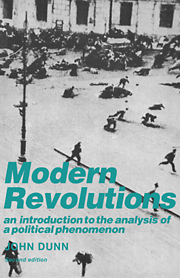Book contents
- Frontmatter
- Contents
- Preface to the first edition
- Introduction to the second edition
- Introduction: the ideological dilemmas of moden revolution and its analysts
- 1 Russia
- 2 Mexico
- 3 China
- 4 Yugoslavia
- 5 Vietnam
- 6 Algeria
- 7 Turkey
- 8 Cuba
- Conclusion: approaches to the ideological assessment and causal explanation of modern revolutions
- Notes
- Bibliography: guide to further reading
- Supplementary reading, 1971–88
- Index
- Frontmatter
- Contents
- Preface to the first edition
- Introduction to the second edition
- Introduction: the ideological dilemmas of moden revolution and its analysts
- 1 Russia
- 2 Mexico
- 3 China
- 4 Yugoslavia
- 5 Vietnam
- 6 Algeria
- 7 Turkey
- 8 Cuba
- Conclusion: approaches to the ideological assessment and causal explanation of modern revolutions
- Notes
- Bibliography: guide to further reading
- Supplementary reading, 1971–88
- Index
Summary
The Chinese revolution produced a regime which has been in attitude and in power highly independent in its performance. In itself, there is nothing very surprising about this; the Chinese revolution was very much made by the Chinese themselves and, although it was very much a Communist revolution, it was one made in a way which owed nothing to the theoretical or practical guidance of the titular agency of Communist internationalism, the Comintern. The precise degree of deviance displayed by Mao Tse-tung at different stages of his career is still a matter of fierce scholastic dispute, but no one has yet suggested that the path along which he led the Chinese Communist movement was in its essentials and throughout its course a product of the theoretical inspiration of the Comintern. In the late 1950s and early 1960s as the Sino-Soviet dispute was beginning to become public, the first efforts were made to distinguish the character of the Chinese regime from that of other prevailing Communist regimes in order to explain the distinctive attitude towards the Soviet Union which the Chinese exhibited. At first sight this explanation was a simple enough matter. The Chinese revolutionary regime, unlike the Communist regimes of the eastern European countries was not a direct product of the tanks of the Red Army or of the massive Russian diplomatic and political pressures on a militarily defenceless nation which brought Czechoslovakia into the Soviet camp.
- Type
- Chapter
- Information
- Modern RevolutionsAn Introduction to the Analysis of a Political Phenomenon, pp. 96 - 120Publisher: Cambridge University PressPrint publication year: 1989



